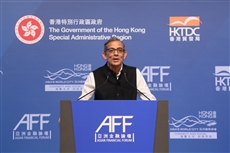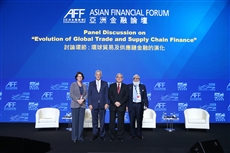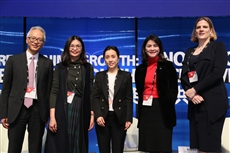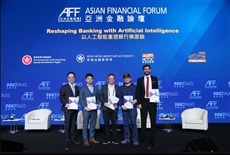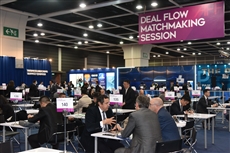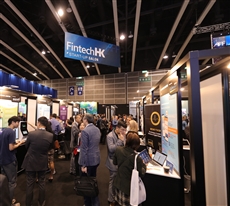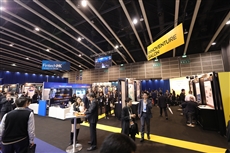Record-breaking 3,500+ finance, business leaders join Asian Financial Forum
15 January 2020 – More than 3,500 distinguished speakers and influential global financial experts, policymakers, business leaders, economists and investors attended the 13th Asian Financial Forum (AFF), a two-day event that concluded yesterday. Under the theme “Redefining Growth: Innovation ∙ Breakthrough ∙ Inclusiveness”, the forum enabled participants to examine the current global economic landscape, gauging their views through on-site real-time polling on issues ranging from prospects for the global economy and sustainability challenges to investment opportunities and the risks brought by technology and innovation. Close to 700 one-on-one matchmaking meetings were arranged during the AFF Deal Flow Matchmaking session, helping investors and project owners to explore investment and business opportunities.
Business sector negative on economy, protectionism stifles global trade
Real-time polling conducted through HKTDC mobile apps at various sessions during the AFF enhanced interactivity and gauged the views of participants on a broad range of subjects. When asked about the outlook for the global economy in 2020, 22% of respondents were optimistic, 38% were neutral, while 40% of respondents expressed pessimism, reflecting a generally negative view on the overall economic outlook. When asked about the major challenge for global growth in 2020, 38% of respondents believed it would be Sino-US trade tensions, followed by intensifying geopolitical risks (36%) and limited headroom for monetary and fiscal policies to support growth (19%).
Regarding the outlook for global trade in 2020, a total of 53% of respondents expressed optimism and neutrality, while for the key driver for the growth of global trade in 2020, most respondents (50%) thought it would be an effective multilateral system.
At the keynote luncheon on the first day of the forum, Dr Janet L Yellen, Chair, Board of Governors, Federal Reserve System (2014–2018), mentioned that central banks will face difficult challenges in implementing policy in the years ahead and may have to rely on quantitative easing and other unconventional policies to combat future downturns. Regarding the Sino-US trade dispute, she said “The dialogue between senior Chinese and US officials is useful and I am glad to see the resumption of the U.S. China Comprehensive Economic Dialogue, which may be helpful in easing tensions in the years ahead. However, Sino-US tariffs are much higher now than before the trade war began and will still have a significant impact on decisions pertaining to supply chains and investment; there are indeed remaining differences to be overcome between China and the United States.”
AI to bring biggest breakthroughs in development of financial services
In response to the AFF’s theme this year, “Redefining Growth: Innovation ∙ Breakthrough ∙ Inclusiveness”, the poll asked participants how likely it was that innovative solutions, such as the development of fintech and sustainable finance, would help address structural issues and bolster global growth. A total of 61% respondents felt it was very likely and likely, while 31% of respondents believed artificial intelligence (AI) would lead to the greatest breakthroughs in the development of financial services, followed by big data analytics (21%), blockchain (17%) and the rise of virtual banks and virtual insurers (15%).
Financial inclusion promotes reform in developing countries
Prof Abhijit Banerjee, joint winner of the 2019 Nobel Prize in Economics and Ford Foundation Professor of Economics at the Massachusetts Institute of Technology, addressed delegates at the keynote luncheon on the second day and shared his studies on how financial inclusion can benefit poorer people in developing countries by providing them with a mechanism to access credit and investment services to help them achieve financial self-reliance. “In this world there are lots of talents. Some of these people are the future of the world and some people are going to do nothing. Somehow what finance needs to do is find ways to identify them, bring them forward, give them what they need, and that way finance can really change the world.”
This year’s AFF also examined environmental, social and governance (ESG) issues for businesses. Most survey respondents (38%) expected climate change and carbon-related issues would be the most prominent ESG issues, followed by environmental regulations (27%) and changing consumer preferences towards more responsible products and services (19%).
Around 700 meetings organised through AFF Deal Flow Matchmaking session
This year’s forum once again featured the AFF Deal Flow Matchmaking session to provide one-to-one deal-sourcing and matchmaking meetings for project owners and investors. Investors taking part in the session included Beyond Ventures, Mizuho Bank and Betatron. Close to 700 meetings were held, covering projects including manufacturing, green technology, the Internet of Things (IoT), fintech and healthtech. The sessions sought to foster more concrete cooperation between participants.
Launched last year, the Fintech Showcase returned in 2020, together with the inaugural FintechHK Startup Salon, to present a plethora of innovations and next-generation business ideas from close to 90 fintech start-ups as well as leading financial institutions and technology firms from Hong Kong and beyond. The InnoVenture Salon was back for the third time on an expanded scale and with enriched content, making it the ideal platform to connect start-ups with potential investors and partners. Through the Startup Zone, Fireside Chat, Pitching, Startup Clinic, one-to-one matchmaking meetings as well as meetups with Hong Kong regulators and market facilitators, comprehensive support was provided to facilitate the development of start-ups.
Overview of 2020 Asian Financial Forum participants’ polling results
|
1. Global economic outlook in 2020 |
Polling result |
|
2. Major challenge for global growth in 2020 |
Polling result |
|
Optimistic |
22% |
|
Limited headroom for monetary and fiscal policies to support growth |
19% |
|
Neutral |
38% |
|
China-US tensions on trade, technology and cross-border investment |
38% |
|
Pessimistic |
40% |
|
Intensifying geopolitical risks |
36% |
|
|
|
|
Elevated corporate debt restraining business spending |
6% |
|
|
|
|
|
|
|
3. Outlook for global trade in 2020 |
Polling result |
|
4. Key driver for the growth of global trade in 2020 |
Polling result |
|
Optimistic |
25% |
|
Fair and appropriate treatment of capital for trade |
18% |
|
Neutral |
28% |
|
Digitalisation of trade |
26% |
|
Pessimistic |
47% |
|
An effective multilateral system |
50% |
|
|
|
|
Commercialisation of blockchain |
6% |
|
|
|
|
|
|
|
5. How likely would innovative solutions help address structural issues and bolster global growth? |
Polling result |
|
6. ESG issues for businesses in 2020 |
Polling result |
|
Very unlikely |
8% |
|
Environmental regulations |
27% |
|
Unlikely |
28% |
|
Climate change and carbon-related issues |
38% |
|
Likely |
40% |
|
Changing consumer preferences towards more responsible products and services |
19% |
|
Very likely |
21% |
|
Labour rights and regulations |
4% |
|
Don't know |
2% |
|
Gender equality in the workforce |
3% |
|
|
|
|
Product Safety |
3% |
|
|
|
|
Corruption |
6% |
Websites
Asian Financial Forum: http://www.hktdc.com/ncs/aff2020/en/main/index.html
International Financial Week Website: http://www.internationalfinancialweek.com
Photo download: https://bit.ly/2TwHgeK
|
|
|
More than 3,500 distinguished speakers and influential global financial experts, policymakers, business leaders, economists and investors attended the 13th Asian Financial Forum (AFF), a two-day event that concluded yesterday |
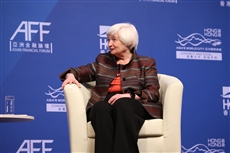 |
| Dr Janet L Yellen, Chair, Board of Governors, Federal Reserve System (2014-2018), was the keynote speaker at the keynote luncheon on the first day of the forum |
|
|
|
Prof Abhijit Banerjee, winner of the 2019 Nobel Prize in Economics and Ford Foundation Professor of Economics at the Massachusetts Institute of Technology, was the keynote speaker at the keynote luncheon on the second day of the forum |
|
|
|
In the session “Evolution of Global Trade and Supply Chain Finance”, the panel discussion examined inclusive solutions. Speakers included (from right to left) Salman Fazlur Rahman, Private Industry and Investment Adviser to the Prime Minister of Bangladesh and Chairman, IFIC Bank Limited; William Fung, Group Chairman of Li & Fung Limited; and Bill Winters, Group Chief Executive, Standard Chartered PLC. The session was chaired by Natalie Blyth, Group General Manager, Global Head of Global Trade and Receivables Finance, HSBC (left) |
|
|
|
The session titled “Asset and Wealth Management in Asia: New Frontiers, Challenges and Opportunities” revealed the latest trends of the future institutionalisation of asset and wealth management. Speakers included (from second left to right) Julia Leung, Deputy Chief Executive Officer and Executive Director, Intermediaries, Securities and Futures Commission; Suyi Kim, Senior Managing Director & Head of Asia Pacific, Canada Pension Plan Investment Board; Amy Lo, Chairman, Executive Committee, Private Wealth Management Association and Head and Chief Executive, UBS Hong Kong Branch; and Geraldine Buckingham, Chair of Asia Pacific, BlackRock. The session was chaired by Howard Lee, Deputy Chief Executive of the Hong Kong Monetary Authority (left) |
|
|
|
A panel discussion titled “Reshaping Banking with Artificial Intelligence" invited (from left to right) Ryan Fung, Chief Executive, Ping An OneConnect Bank; Nelson Chow, Chief Fintech Officer, Fintech Facilitation Office, Hong Kong Monetary Authority; Dick Fong, Emerging Technology Leader, PwC; Toby Chen, Deputy General Manager, AI Group, WeBank; and Medhy Souidi, Head of FinTech & StartupXchange, DBS and Board Member of the FinTech Association of Hong Kong |
|
|
|
The AFF Deal Flow Matchmaking session provided one-to-one deal-sourcing and matchmaking meetings for project owners and investors. More than 700 meetings were held this year, covering projects including production and environment technology, fintech, digital technology, healthcare technology, infrastructure and real estate services, education, environment and energy, and agriculture |
|
|
|
The inaugural FintechHK Startup Salon presented a plethora of innovations from more than 80 fintech start-ups as well as leading financial institutions and technology firms from Hong Kong and beyond |
|
|
|
The InnoVenture Salon was back for the third time on an expanded scale and with enriched content, making it the ideal platform to connect start-ups with potential investors and partners |
Media enquiries
Please contact the HKTDC’s Communication and Public Affairs Department:
Christine Kam Tel: (852) 2584 4514 Email: christine.kam@hktdc.org
Sam Ho Tel: (852) 2584 4569 Email: sam.sy.ho@hktdc.org
Clayton Lauw Tel: (852) 2584 4116 Email: clayton.y.lauw@hktdc.org
HKTDC Media Room: http://mediaroom.hktdc.com
About HKTDC
The Hong Kong Trade Development Council (HKTDC) is a statutory body established in 1966 to promote, assist and develop Hong Kong's trade. With 50 offices globally, including 13 in Mainland China, the HKTDC promotes Hong Kong as a two-way global investment and business hub. The HKTDC organises international exhibitions, conferences and business missions to create business opportunities for companies, particularly small and medium-sized enterprises (SMEs), in the mainland and international markets. The HKTDC also provides up-to-date market insights and product information via trade publications, research reports and digital news channels. For more information, please visit: www.hktdc.com/aboutus.



